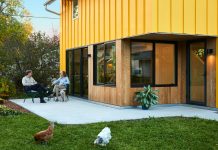In the 1967 movie The Graduate Mr. McGuire famously told a bewildered Ben that plastics were the future. Turns out he was right. Fifty years later plastic is so ubiquitous that once you start taking stock, it’s kind of horrifying. That boho blouse with the billowy sleeves and silky fabric? Probably made from plastic polyester fibers. The takeout container showcasing a free-range egg salad on non GMO wheat bread? Also petroleum-based plastic. Even the comfy foam cushions on the patio chairs are likely made from polyurethane (plastic). Prescription bottles, chip clips, straws, pens, curtains, rugs—it’s everywhere because in many ways plastic is an excellent material. Strong, light, flexible and inexpensive to produce, it would be perfect except that it’s made from chemicals and never goes away—nature does not take its course with plastic, so plastic today will be plastic tomorrow. None of this would be a problem if we kept it forever like grandma’s china. But we don’t, and it’s gotten a little out of hand as anyone who has turned down a plastic bag for one item at the grocery store or sustained a nasty flesh wound from trying to cut a toy out of its disposable plastic packaging can attest to. Many consumers recycle what they can and some of it makes its way into new products (milk jug furniture), but a lot of it doesn’t and adding to the problem comes the announcement from China that they won’t take any more of our plastic waste (yes, we were shipping it to them). So more people are looking for alternatives and fortunately for Twin Citians, they don’t have to look far.
Ryan North of Minneapolis eco home store Moss Envy sells a lot of plastic alternative products to his customers, but he says it’s not so much the health of Mother Earth they’re concerned about as their own and that of their family. “People are worried about the off-gassing effect of plastic, especially with anything that comes into contact with food or skin,” he says. “Parents with young children or babies are particularly concerned as their skin and respiratory systems are more vulnerable.” One area where they’ve seen growth is in organic mattresses—a natural alternative to conventional mattresses which often contain flame-retardant chemicals such as boric acid, a substance also used to kill roaches. They carry the biggest selection of organic mattresses in the region. Moss Envy, 3056 Excelsior Blvd, Minneapolis.
Packing her sons school lunches is what motivated Juhi Gupta Gulati to develop a better food storage container—one that could withstand the rough and tumble of a lunchbox and also go from freezer/fridge to oven/microwave to dishwasher. “The only choices were plastic which leaches toxins when heated, metal that you can’t microwave and glass that gets hot when microwaved. Plus, glass breaks and I didn’t want to worry about my kids opening up a lunchbox of broken glass.” Her solution? Shatterproof glass containers wrapped in a patented silicone sleeve that acts like a shock absorber and stays cool when heated. Silicone is derived from sand and considered completely food safe (and body safe as evidenced by breast implants). The lids are also made of silicone and can be used when reheating food, plus you can write on the silicone (it washes off). Her product and Eden Prairie company are called Frego (a combination of ‘free’ as in free of toxins, free to heat, etc. and ‘go’ as in sturdy enough to go places). Available online and in some local stores.
Jen Bremer of Minneapolis based Nokomis Knitting Company stumbled across the idea of wool dryer balls when she was looking for gift ideas for her sister and a friend who were expecting their first babies. “I wanted something natural and ended up on an environmental website reading about all these products like dryer sheets that we don’t necessarily think about too much, but that can potentially cause us, and our wee ones, harm. Since I’m a fiber person, I thought I’d make some of these for those little babies that were coming.” Her 100 percent wool dryer balls can be used instead of polyester dryer sheets that don’t decompose and contain harmful ingredients. They do the same job as the disposable sheets—reduce static, soften fabric and help eliminate wrinkles—and they also reduce drying time which saves energy. One ball can be used for 500 plus loads. And since wool is biodegradable, used balls can be composted or disposed of with a clear conscience. If fragrance is desired, a few drops of essential oil on the ball will do the trick. Available online and at some local craft shows.



















